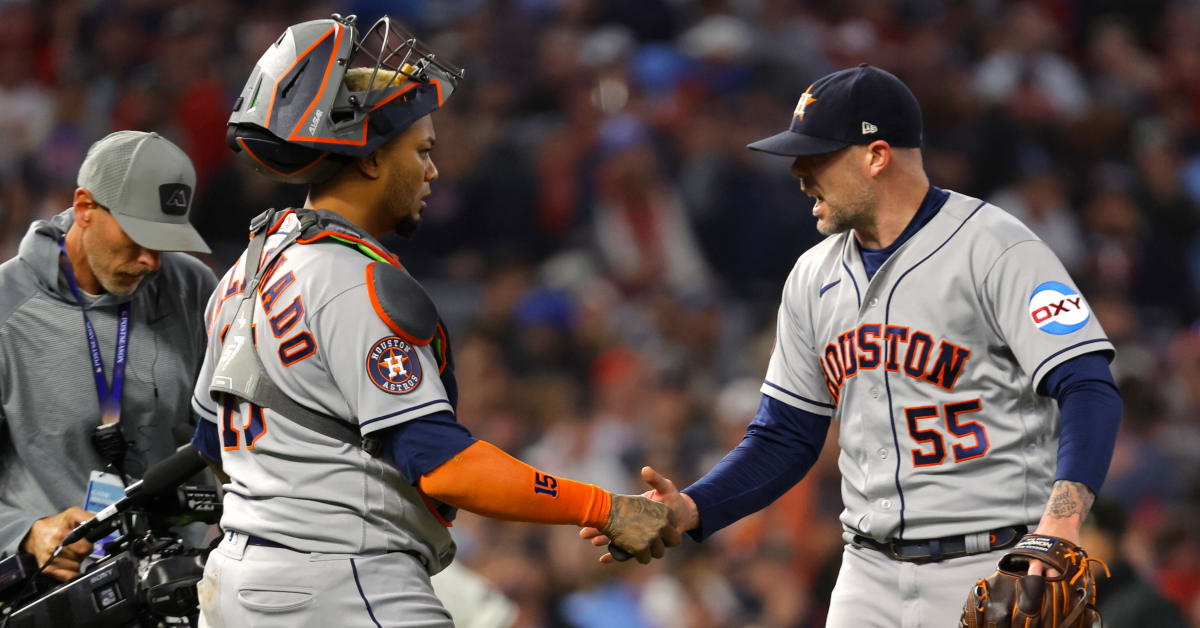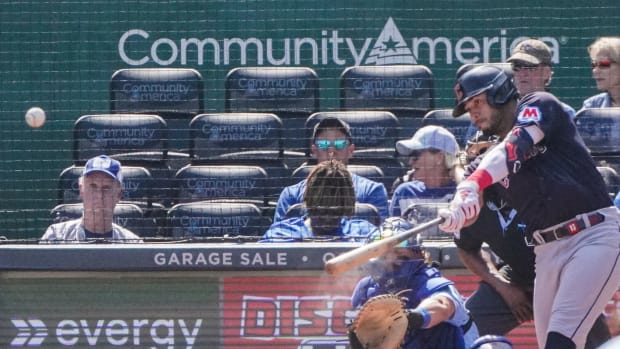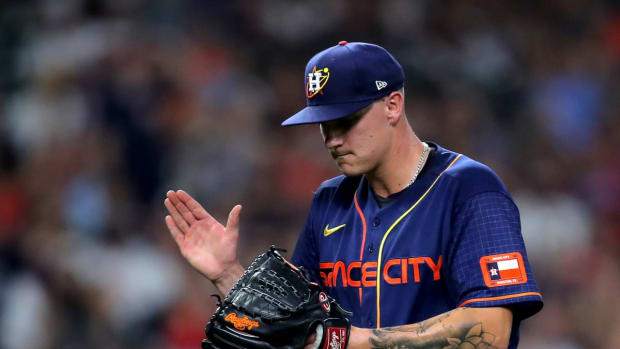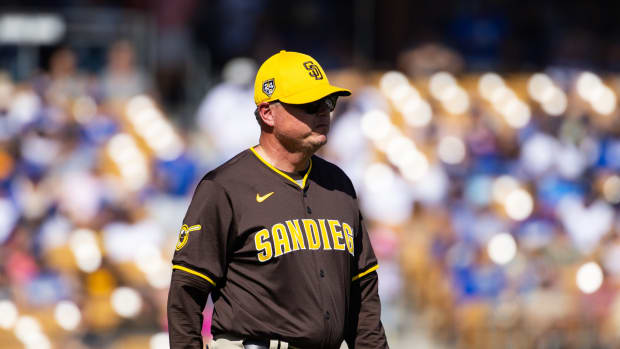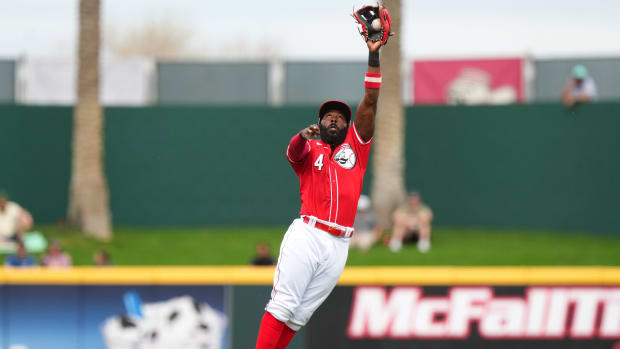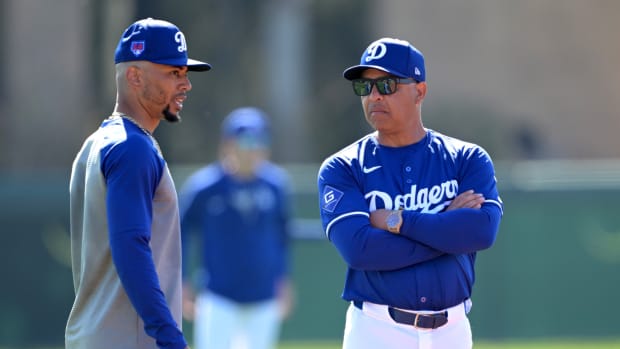Martín Maldonado Pilots the Astros Through Another Hostile Environment Into Another ALCS
The graveyard of hope that is the clubhouse of a freshly eliminated team is a painful place. Platitudes serve as balm. But when shortstop Carlos Correa stood in the middle of the Twins’ clubhouse moments after the Astros ended their season, the former Astro coldly defined the stark reality every team in the American League faces.
“We’re going to have to beat that team,” Correa told his teammates about his former teammates. “In order for us to get where we want to go, we’re going to have to beat that team. It’s that simple. They’re going to be there year in and year out.”
The AL pennant goes through Houston for a seventh straight year. Houston is 32–13 (.711) against AL teams in the postseason since 2019. Next up to take a crack at the defending world champions: Texas.
Any Rangers scout who watched Houston close out Minnesota with a 3–2 win in ALDS Game 4 could have filed the advance report before the series was even played. There is nothing new about how the Astros play winning postseason baseball: They win the all-important home run and strikeout wars—and they are never satisfied.

Jose Altuve (center left) and the Astros are headed to their seventh consecutive ALCS.
Jesse Johnson/USA TODAY Sports
Houston outhomered Minnesota in the series, 10–5. Its pitchers struck out 52 batters to the Twins’ 37. You are not winning a postseason game by putting just 13 balls in play, as the Twins did in Game 4 against Houston pitchers.
Yes, Minnesota led the world in strikeouts on offense. But Correa knows what happened to the Twins’ offense is what he saw happen in four previous Octobers with Houston: opponents get Maldonado-ed.
Playing the Astros with Martín Maldonado behind the plate is like walking into a fun house room of mirrors. Nothing is as it seems. Confusion reigns. Houston starter José Urquidy makes one start in the past 48 days and suddenly he is Mike Scott, an unhittable Astro from postseasons past. The Twins swung and missed 19 times at his pitches in Game 4, four more than Urquidy obtained in any game this year.
This kind of pitcher whispering has been going on for years. Why have the Astros won four straight postseason series? Here’s a good place to start: Their pitchers have won the strikeout war, 212–155.
“I don’t want to give credit to Maldonado, because, you know, he’ll bring it up at some point when I talk to him in the offseason,” Correa said, shaking his head. “But he knows what he’s doing behind the plate. And he knows every hitter’s weaknesses and he’s going to try to exploit. He pitches against the [hitters’] expected slug.
“He does all that, and we knew it and still it was hard to make the adjustments. The way he was pitching backwards … hitters counts, he will go off-speed and then counts where you throw off-speed regularly, he’ll go fastballs up. You know, they did a good job of mixing and matching. We just have got to get better and we got to have a better plan, and there’s a lot of things that could have gone better for us and they didn’t.”

Maldonado (left) orchestrated an Astros pitching performance that limited the Twins to three runs across two games in Minnesota.
Bruce Kluckhohn/AP
The Rangers present a bigger challenge than Minnesota if only because their hitters are about league average when it comes to strikeouts (22.5%). But Texas’s pitching staff is below average when it comes to strikeouts (22.4%), and that will allow Houston its usual stone-ground game of wearing down pitchers.
Take it from Correa, as much of a qualified insider as you will find to explain why the Astros are so tough to take out in the postseason. After Minnesota won Game 2 behind a brilliant pitching effort from Pablo López, Correa warned, “I know what happens when they lose a game. I’ve been on the other side, and I know the speech and the meetings and all the stuff that happens. They’ll be ready to go in the next game.”
The Astros scored four runs in their next turn at bat, the first inning of Game 3. In two games following the loss, Houston pitchers allowed a total of three runs on six hits with 28 strikeouts—on the road. The Astros are on an 8–2 run that includes a 7–1 mark at Seattle, Arizona and Minnesota.
Asked whether he knew what it would take to stop the Astros, Correa said, “Yeah, you can’t make mistakes. You’ve got to play near-perfect baseball. If you look at them, they make few errors, they get timely hitting and they get the long ball when they need it.
“They’ve got a lot of experienced guys. They've been in the playoffs for so long that to them, it just feels like a regular game. There's no pressure. They just perform and, you know, kudos to them. They've been doing it for a while. So we have to go next year and get better and figure out a way to beat them.”

Correa led the Twins in batting average (.409) and on-base percentage (.458), but he was one of only two Minnesota hitters to bat over .250 for the series.
Jesse Johnson/USA TODAY Sports
Before Game 4, Astros manager Dusty Baker was especially eager to close out the series that night. He knew the best path for Houston to win a second straight World Series—and end the 22-year drought without a repeat champion, the longest ever among the four major team sports—was riding on Game 4. That’s because if Houston lost, not only would the Astros have to face López again, but they also would have to start Justin Verlander, which would have made him unavailable until ALCS Game 3 if they had advanced.
Maldonado guided four pitchers through the night. In ancient Greece, the captains of trading vessels would hire local fishermen to bring their ships safely into harbor. These locals who knew the waterways so well became known as harbor captains, or as they were known in Greek, pedon, literally the blade of an oar. From pedon, we get the word “pilot.” Today, often as required by law, we have pilots who must be hired to board large vessels or those with hazardous cargo to steer the boat safely to shore. Maldonado is the baseball equivalent of such pilotage.
Urquidy baffled the Twins with an assortment of floaters and benders that amounted to 58% of his pitches being clocked under 90 mph. Then Hector Neris (five swings and misses) tricked the Twins with fastballs and splitters 10 mph apart. Then Bryan Abreu (four swings and misses) hit 99.7 mph while mixing in enough of his filthy sliders. Then Ryan Pressly (three swings and misses) threw spinners on 14 of his 18 pitches.
Neris, Abreu and Pressly obtained the last 10 outs without letting the ball leave the infield: eight strikeouts and two pop-ups. Overall, the Twins swung and missed almost half the time they tried to hit Houston’s pitches: 31 times on 63 swings.
The coup de grace was how Maldonado piloted Pressly through the ninth inning. Pressly struck out Jorge Polanco on six straight breaking balls, the last a 3-and-2 slider. Then he struck out Royce Lewis on a 3-and-2 curveball. With Correa lurking on deck, Pressly fell behind Max Kepler 3-and-1. Another ball would bring Correa to the plate as the winning run, with a chance to add to his 63 career RBIs, third most all time.
“I wanted that at-bat so bad,” Correa said. “I know Presley very well and, you know, it would have been a fun matchup.”
Pressly threw Kepler another breaking ball, a slider that caught the thick of the plate. Kepler fouled it back.
Now it was 3-and-2, again. Pressly had thrown full-count breaking pitches to both Polanco and Lewis. Over this year, including the postseason, Pressly threw breaking pitches 85% of the time on full counts.
It would have to be another breaking pitch, right?
Wrong.
Pressly threw a fastball that dotted the outside corner. Stunned, Kepler never moved his bat. Umpire Jansen Visconti called it strike three.
Pressly had thrown 68 full-count pitches since July 15, 2022. This was the first one that was a fastball called for a strike. It was the perfect pitch—and the perfect ending to another team getting Maldonado-ed.






























